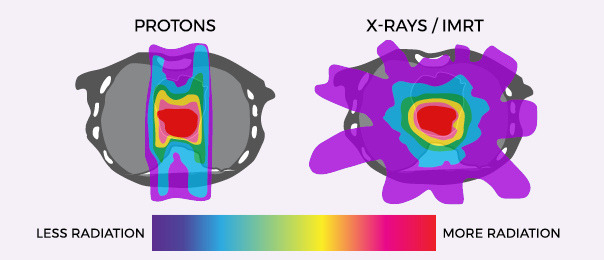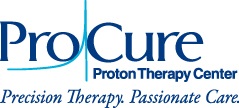Request a consultation about proton therapy cancer treatment
To learn more about proton therapy or to schedule a consult, please fill out the form below and someone will contact you to answer your questions.
What is Proton Therapy for Gastrointestinal Cancers?
Minimal Side Effects. Optimal Results.
Proton therapy is a highly-effective cancer treatment that delivers radiation at exact depths to precisely target tumors of the gastrointestinal tract.
The pinpoint accuracy of proton therapy spares surrounding healthy tissue and organs from harmful radiation, drastically reducing the risk of damage as well as short and long-term side effects.
Treating Gastrointestinal Cancers with Proton Therapy in New Jersey
Due to their complexity, irregular shape, and location, cancers of the gastrointestinal tract can be challenging to treat with standard X-ray radiation. X-rays release their maximum dose of radiation quickly after penetrating the skin, damaging healthy tissue and organs on their way to the tumor and as they pass through the body beyond the tumor. With proton therapy, much of the radiation is deposited exactly at the tumor site and then stops, reducing excess radiation to nearby healthy tissue.
The targeted precision of proton therapy is particularly suited to treating gastrointestinal cancers. It allows for maximum delivery of radiation directly into the tumor with minimum radiation exposure to nearby critical organs such as the bladder, stomach, small and large intestine, liver, gallbladder, pancreas, kidneys, genitals, and spinal cord.
This results in substantially fewer side effects both during and after treatment, with patients able to continue with their usual activities with little disruption.

Proton Therapy vs X-Ray/IMRT for Gastrointestinal Cancer
Proton therapy delivers significantly less radiation to nearby critical organs and structures. These images show the areas around the liver exposed to radiation during treatment. Where standard X-ray treatment releases radiation from the moment it penetrates the skin and all the way through to the other side of the tumor, proton therapy deposits radiation directly into the tumor without exiting through surrounding healthy tissue.
Pencil Beam Scanning in New Jersey
At ProCure, we use the most precise form of proton therapy to treat gastrointestinal cancers. Pencil Beam Scanning precisely controls protons to place the Bragg Peak, the point at which protons deposit their maximum energy, directly into the tumor. The ultra-precision of this technology makes it an ideal treatment for tumors of the gastrointestinal tract, including irregularly shaped or complex tumors.
Benefits of Proton Therapy for Gastrointestinal Cancer
- Precisely targets the tumor, maximizing dose to affected tumor cells
- No exit dose minimizes radiation exposure to surrounding healthy tissue and vital organs, including the bladder, stomach, small and large intestine, liver, gallbladder, pancreas, kidneys, genitals, and spinal cord
- Reduced risk of gastrointestinal side-effects such as nausea, vomiting, diarrhea, and dehydration 1,2
- Ultra-precision enables the most complex and irregular-shaped tumors to be treated with greater accuracy
- Reduced odds of recurring and radiation-induced secondary cancers2,3
- FDA-approved treatment
- Lessens potential for serious complications such as ulceration, perforation, and internal bleeding caused by radiation damage
- Can be used in combination with or as a follow up to conventional radiation, chemotherapy, and/or surgery
- Patients can maintain their quality of life during and after treatment
Is Proton Therapy for Colon Cancer Right for Me?
Most patients with gastrointestinal tumors are good candidates for proton therapy. At ProCure, the tumors we treat include:
- Esophageal
- Stomach
- Pancreatic & Bile
- Liver
- Rectal
- Anal
- Colon
To learn more about proton therapy for gastrointestinal tumors, call to schedule a consultation with one of our radiation oncologists. During the consultation, we will work with you to determine a course of treatment that is right for you.
Gastrointestinal Cancer Treatment FAQs
Proton therapy is an advanced form of radiation that destroys cancer cells by preventing them from dividing and growing. Proton therapy uses protons—positively charged atomic particles—instead of the photons used in standard X-ray radiation therapy. With proton therapy, doctors can precisely target the tumor while minimizing damage to the surrounding, healthy tissue. Unlike standard X-ray radiation, protons deposit much of their radiation directly in the tumor and then stop.
Depending on your diagnosis, treatments are usually given 5 days a week for a period of 4-7 weeks. Each treatment session can range from 15-60 minutes, but the actual proton delivery is only about 60 seconds.
Most patients do not feel pain or discomfort during treatment. The majority of the time patients spend in the treatment room involves setting up for treatment.
Your radiation therapists will have everything ready for you before the treatment begins. You will be moved into position before each treatment using an FDA-approved robotic positioning system. You will be asked to lie still on a treatment bed while your therapists make adjustments. After you are in position, the proton beam is delivered and is on for about one minute. You will not feel or see the proton beam. You may hear some clicking from the equipment around you, but generally, after a few treatment sessions, the sounds go unnoticed. During the actual treatment, your therapists will leave the room and monitor your treatment from a control room just outside the treatment room. Although they are not in the same room as you, they can see and hear you through a video monitor. They remain close by and you can easily talk to them if you need anything.
There is no need to stay overnight in a hospital or remain at the center after your treatment. In most cases, you can go about your normal routine before and after your session.
Yes. Proton therapy can be used in combination with or as a follow up to conventional radiation, chemotherapy, and/or surgery.
ProCure treats gastrointestinal tumors found in the:
- Esophagus
- Stomach
- Pancreas
- Liver
- Rectum
- Anal canal
- Colon
If your condition is not listed, you may still benefit from proton therapy. Please reach out to the center to arrange a consultation and discuss if proton therapy is an appropriate treatment option for you.
Proton therapy is covered by Medicare and many private insurance providers. The center has financial counselors who are dedicated to guiding you through the insurance process and will work with you to review benefits (such as co-pay, deductible, out-of-pocket costs) offered by your insurance company. If you have questions about coverage, please contact us and have your insurance plan, group number, and member ID ready. Once supplied to the center, one of our intake members will be in contact to review the benefits offered by your insurance company.
Proton therapy and X-ray radiation therapy both treat gastrointestinal tumors by destroying the tumor’s cells when they attempt to divide and multiply. However, there is an important difference. X-ray radiation releases its maximum dose of radiation quickly after penetrating the skin and continues to release radiation as it passes through your body beyond the tumor, exposing more tissue to unwanted radiation and potentially causing more damage to healthy tissue and organs.
Proton therapy delivers most of the radiation exactly at the tumor site and then stops. There is essentially no radiation exposure beyond the tumor site once the radiation has reached and covered the treatment area. This allows proton radiation to target the tumor while reducing radiation exposure and potential damage to normal healthy tissue.
Yes. A study from the University of Texas MD Anderson Cancer Center in Houston, TX (published in International Journal of Radiation Oncology, Biology, Physics) showed proton therapy provided significantly better sparing of the lung than IMRT in the treatment of esophageal cancer.4
Further research studies validating the benefits of proton therapy can be found on our Research page.
Many patients with gastrointestinal tumors are good candidates for proton therapy. If you are interested in proton therapy as a treatment option, we can schedule a consultation for you to speak with one of our radiation oncologists. During the consultation, the radiation oncologist will discuss different treatment options with you and determine if you may benefit from proton therapy. The radiation oncologists at ProCure use various forms of radiation to treat gastrointestinal cancer in addition to proton therapy, so they will provide you with a treatment recommendation that is best for you.
Talk To Us
Find out if proton therapy is the right treatment for you. Contact our Care Team or request more information online.
Attend An Information Session
Learn more about proton therapy and our world-class Care Team. Contact the center to reserve your place.





